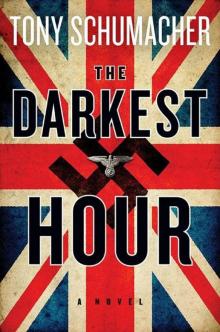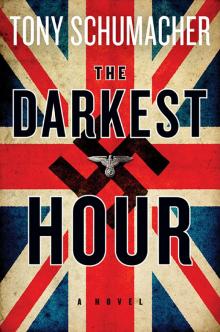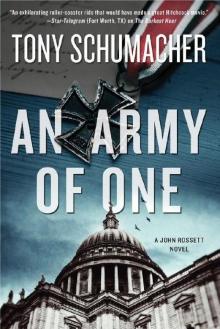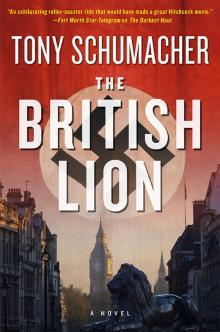- Home
- Tony Schumacher
The British Lion Page 3
The British Lion Read online
Page 3
“Go back to the Germans. They’ll have you.”
“No.”
“You’d do well with them; you’ve done well with them. Promotions, nice easy job, maybe they’ll give you an apartment?”
“I want to be a policeman.”
“Why?”
Rossett shifted his weight onto one leg and then, for the first time, wandered to the window. It was colder by the window, and across the south side of the Thames Rossett could see black snow falling from a gray cloud miles away. It looked like charcoal shading in a picture of the sky, and he squinted, trying to see it more clearly than the distance and dirty glass would allow.
Half a minute passed until finally he spoke without turning around.
“To be good again.”
“What?”
“I want to try to make up for what I’ve done.”
“You’ve been doing your job; you’ve done nothing wrong.”
“You don’t know what I’ve been doing,” Rossett replied, becoming aware that he could see himself inches away, reflected in the glass.
He needed a shave.
“You said it yourself: you’ve been following orders. No one will criticize you for that.”
Rossett turned and faced Reade, who stared back at him.
“You don’t know what I’ve been doing.”
ROSSETT DIDN’T HAVE many friends left.
In truth, although he tried not to think about it too much, he’d never had many friends to start with.
As time had passed, and he had slipped further into the machinery that made up the Third Reich, his Christmas card list had gotten shorter and shorter, until finally there were only one or two names left on it.
Not that he bothered sending cards anyway.
One of those names was walking toward him as he stood next to his Austin, finishing his cigarette, staring at the Thames, as the first snow of winter fell steadily outside the station.
He’d known Bill Fraser for over ten years. First they’d been young coppers together, walking the beat and dodging the sergeant on night shift. Then, after years of those shifts had passed by, they’d become the sergeants searching for lazy bobbies.
They were that rare thing, friends who could pick up where they left off. Years could pass and a conversation would continue as if one of them had paused for breath.
“Gi’s a fag, John?” Fraser flicked his fingers toward the cigarette Rossett was holding.
Rossett smiled, took out the packet, and passed it across the roof of his car.
He waited for Fraser to light up, then caught the cigarettes when Fraser tossed them back.
“How you doin’? I heard you were in hospital?”
“You didn’t come and see me.”
“German hospitals give me the creeps.”
Rossett nodded and gave a slightly thinner smile. “Stiff and sore, but getting there.” He took a drag on his cigarette, watching his friend.
“You back on the job?” Fraser jerked a thumb toward the police station.
“Not yet.” Rossett noticed for the first time in their long relationship that the conversation seemed stilted, hanging awkwardly between them.
“You ain’t missing much.”
“You’d be surprised.”
Fraser leaned against the roof of the car and rolled the cigarette in his fingers, studying it.
“Everything all right, Fraze?”
Fraser tilted his head and then gave a tiny shake; he frowned.
“No, mate, I’m sorry.”
“What’s up?”
“I wanted to say . . . well, I heard you was looking to come back ’ere.”
“And?”
Fraser shrugged and shoved his hands in his pockets against the cold. Here and there patches of gray cobbles poked through the snow, like mountaintops through thick cloud.
“It’s not like in the old days, mate.” Fraser’s cigarette bobbed as he spoke.
“So I keep hearing.”
Fraser shifted his feet in the snow, scratching away until he could see a cobble under his boot.
“The whole place has changed, John, it isn’t like it was. The crooks are crookeder, most of the bobbies are worse, even the magistrates ain’t averse to a little touch or two, if you know what I mean.” Fraser winked.
“What about the sergeants, Fraze?”
Fraser looked behind him and then joined Rossett on his side of the car, leaning in close enough that their shoulders touched. He took the cigarette out of his mouth.
“Things are tough round here, John. We’ve got resistance and smugglers, on top of the usual thieves and vagabonds we knew back in our day. Christ almighty, most of them are the same people who’ve stepped up a gear.” Fraser looked over his shoulder at the station and then continued. “When you worked here it was a picnic. Nowadays you don’t know who you’re talking to. You’ve got to be careful; there is a lot of money to be made, inside the law or outside the law. It isn’t just money, either: one wrong word, a dirty look, or a rumor spread can have you up in front of the Gestapo, and I don’t need to tell you about them.”
“If you do your job the right way, you’ve nothing to worry about. It’s very simple,” Rossett said softly.
Fraser chuckled.
“Simple for you, maybe. Not so simple for the blokes who want to go home to their families at the end of their shift.”
Rossett looked at Fraser, who immediately regretted his words.
“I’m sorry. I didn’t mean . . . your family. I’m sorry.”
Rossett stared at the river, putting his cigarette into the corner of his mouth. The cigarette glowed orange, the only color for what seemed like miles around.
Rossett breathed out the smoke through his nose as Fraser tried again to explain his position.
“All I’m telling you is it can be dangerous.”
Rossett nodded, then looked at Fraser again.
“Are you a bent copper?”
Fraser opened his mouth as he took half a step away from Rossett, their shoulders no longer touching.
“What?”
“Are you a bent copper?”
“You’re asking me that?”
“I am.”
“I can’t believe you’d ask me.”
“You can’t believe I’d ask you because we’re mates? Or because nobody asks that question?”
“Because we’re mates.”
“I’m sorry.” Rossett finally blinked.
Fraser nodded, then followed Rossett’s gaze across the river.
“This place is all changed. Time was, if we knew who was up to no good we would just go and lift ’em. Now, well . . . we know who runs the manor and we can’t touch ’em.”
“Who is that?”
“What?”
“You know who runs the manor—who is it?”
Fraser took the cigarette out of his mouth.
“No, mate. Seriously, no . . . I want to go home of a night, and you want to be careful.”
Rossett thought about the answer as he lowered his head and flicked away his cigarette into the snow to smolder and die.
“You’ve got to learn, John, things have changed around here. Do you understand?”
“I thought I understood.” Rossett pushed himself off the car and turned to face Wapping Police Station with its bare brown brick, topped off with a limp Union Jack, hanging next to an even limper bloodred swastika flag. “I’m not so sure now.”
“You take care, John, you hear me? Take care about what questions you ask and where you ask them. It’s dangerous, even for someone like you.” Fraser tapped a finger on the roof of Rossett’s car and turned to head back into the station. Rossett looked up at the heavy gray sky and the dots of snow that were falling faster from it.
; He looked back at the station where he had learned to be a policeman all those years ago.
It seemed the same on the outside, all except for the swastika.
Rossett fingered his own swastika lapel badge and then looked down at it. He and the station had a lot more in common than he cared to admit. He watched as Fraser jogged up the steps and pushed against the heavy entrance door.
“Fraze!” Rossett shouted. Fraser stopped and turned, half in, half out of the building, one hand holding the door open.
“What?”
“I just want to be a policeman again.”
Fraser stared at Rossett, then let the door swing shut behind him, leaving Rossett alone in the snow.
CHAPTER 4
January 1947
YOU’VE FULLY RECOVERED, Ernst?”
“Yes, sir. Thank you, sir.”
“The hand?”
Koehler lifted his left hand and studied the black glove before wiggling his remaining fingers.
“It’ll never be the same, sir, but it is better.”
“Good, that’s very good.” Oberführer Adolf Hahn studied Koehler, who sat stiffly in front of him on an uncomfortable wooden chair, before looking down at the file on the desk and half turning a page. A minute passed before he spoke again, this time not bothering to look up.
“So you’re totally healed?”
“I think so, sir.”
“How long have you been on restricted duties now?”
“Just over two months, sir.”
“Hmm.” Hahn returned to reading the file.
Koehler silently puffed out his cheeks once he was sure his boss wouldn’t look up at him. He looked around the office, noting how bare it was compared to his own: no books, no pictures, no plants, no soft settee, no rugs, nothing.
“I don’t understand.” Hahn interrupted Koehler’s sightseeing.
“Sir?” Koehler whipped his eyes back to his boss.
“If you are fully fit, why are you asking to go back to Germany?” Hahn removed his wire-framed spectacles from his nose, signaling he’d finished with the written request Koehler had spent days composing.
“As I say in the report, sir, I feel, with respect, that I could do more for the Reich back in Germany.”
“You do say that, but you don’t say why.”
“Sir?”
“You don’t say why you think you’d be more useful in Germany than in London. If it was because you were no longer fit enough to do the job, well, I could understand that, but this . . .” Hahn lifted his index finger and then rested it on the file, as if it were a dagger jabbed into the tabletop. “This doesn’t tell me anything.”
“I feel . . .”
“You feel? Feelings don’t come into it, Major. Tell me what you know.”
Koehler shifted on the chair and looked at the brown carpet for inspiration; there wasn’t any there.
“I just thought, sir . . .”
“What you know, Major, what you know.”
Koehler tried again.
“I know, sir, that I’ve been here a long time.”
Hahn nodded.
“I also know,” Koehler continued, “that my work has been to the highest standard.”
“Without doubt.” Hahn nodded.
“And I think—”
Hahn held up his hand for Koehler to stop speaking, and Koehler obliged.
“That, Major, is the problem. You think. You don’t know, you merely think. Thinking, feeling, wanting: none of that matters when you are a soldier. Knowing matters. Knowing is the key.”
“I know I am tired, sir.”
“We are all tired.”
“I know I miss my family, sir.”
“Many men miss their families, Ernst. You still haven’t told me why you are different.” Hahn rested his finger on his temple, waiting for Koehler to continue.
Koehler rocked slightly to the side and then shook his head, looking again at the carpet.
“I want to go home, sir; it is that simple. I need to go back to Germany. I can’t do this job anymore. The last few months have shown me that I am not the right person for the role that I’ve been given. I can’t do it; I’m finished.”
Hahn shook his head.
“You have been ordered to do your job. The person who orders, it is he who decides when a job is finished, not the person doing it.”
Koehler kept looking at the brown carpet. Tiny lines in the weave made it look like the plowed fields Koehler had seen far below when he had flown out of Moscow back to Berlin all those years ago.
Another lifetime.
Hahn opened Koehler’s file once more. He picked up a pencil and tapped it on the desk.
“Your family are visiting you, are they not?”
“Yes, sir.”
“When do they go back?” Hahn said without looking up.
“Four days, sir.” Koehler’s mood lifted along with his head.
Hahn leaned back in his chair studying Koehler, who stared back, unsure of what was coming next.
“You are a good soldier, Ernst. Your men would do anything for you, your superiors speak highly of you, and you run a tight ship. Your work with the Jews has been extremely efficient and is to be commended.” Hahn toyed with the pencil again. “Your adventure last year with this Rossett character, exposing those resistance cells, was unconventional but effective. For that work, the Reich and the Führer are extremely grateful. You are being awarded Oak Leaves, aren’t you?”
“Yes, sir.”
“Good. Well deserved.” Hahn clasped his hands in front of him again, still holding the pencil, which stuck out the top like the plunger on a firing box.
“Thank you, sir.”
Hahn stared at Koehler without speaking, for so long Koehler found himself shifting in the chair.
“Am I dismissed, sir?”
Hahn leaned back from the desk, then tapped the pencil against his teeth before speaking again.
“You’re not losing faith, are you, Ernst?”
“Faith, sir?”
“In what we do, and the people we do it for?”
Koehler stiffened and suddenly regretted writing the transfer request.
“No, sir.”
Hahn frowned.
“Germany calls on us. The Fatherland makes great demands. Demands that many find difficult to live up to. You’ve been tasked with an unpleasant job—a vital job, but unpleasant nonetheless.” Hahn leaned forward again and lowered his voice. “It would be understandable if your work with the Jews in London became a difficult cross to bear. If you’ll pardon the pun.” Hahn smiled thinly at his own joke.
“My record speaks for itself, sir.”
“Records are history. It’s the present I’m talking about, so I’ll ask you again. Are you losing faith?”
“I’m not losing faith, sir.”
Hahn smiled before standing up and wandering over to the window.
Koehler twisted to look at his boss as he spoke.
“Does the business with the Jews offend you, Ernst?”
“Not at all, sir. It is important work that needs to be done,” Koehler replied, surprised to find his eyes straying toward a portrait of the Führer.
He looked away quickly and scratched at his ear.
“You can speak freely, Ernst. You have my word as an officer that nothing will leave this room,” Hahn said, still staring out the window.
Koehler didn’t reply, for fear of falling into a trap. He noticed his left hand was aching again, and he had to fight the urge to rub it.
“It’s been a long war, Ernst,” Hahn said at the window. “For some, longer than others. You are one of those others. I understand that you are tired, and when people are tired, they make mistakes.”
Like asking fo
r a fucking transfer, Koehler thought to himself.
“But you can relax with me here. Here and now, Ernst, in this room, you can speak freely. I’ll ask you again: does this business with the Jews offend you?”
Koehler turned to look at Hahn, swiveling slightly in his chair. He paused, looked down, and then back up again at Hahn, who still stared out over London from the window.
Say nothing, Koehler thought. Just say nothing and get the fuck out of this office as soon as possible.
Silence sat on his shoulders like a shroud. Hahn didn’t move an inch. Somewhere down a corridor a phone started to ring.
Eventually Hahn turned to look at Koehler and smiled like a grandfather—warm, soothing. His face was half in shadow as he waited for an answer.
“It seems vindictive, sir,” Koehler heard himself say. His heart pounded, one, two, three. He swallowed and spoke again. “We’ve won the war, these people are pathetic, and yet . . . and yet we keep punching them like . . . playground bullies. It seems so pointless. I’ve seen them, I see them every day.” Koehler looked at the carpet and lowered his voice to a whisper. “They aren’t a threat.”
Hahn nodded.
“You think the job is done?”
Koehler looked up. “I don’t know, sir . . . I’m just struggling to do it. I can’t sleep, I feel guilty, so guilty about it all. I’ve turned into a monster.” Koehler paused, feeling his cheeks flush and pressure build behind his eyes. “Having my family here, it’s made me see myself. What I do to others . . . and what it does to me.”
Hahn crossed the room and sat down on the corner of his desk near to Koehler.
“Why did you join the SS, Ernst?”
“To be the best, sir. I wanted to fight with the best, and to be the best.”
“Not just the uniform?” Hahn smiled.
“Well, a little of that, sir, yes,” Koehler smiled back.
“I joined in the early days, back in ’33; we had real enemies then, real threats. The Jews and the Bolsheviks were destroying Germany. The enemy was real. You could see them, punch them in the nose, and they punched you back. Now . . .” Hahn chuckled. “The enemy is some frostbitten Russian peasant sitting in a ditch waiting to starve to death. Soon he’ll be gone and we’ll have nobody left to fight.” Hahn took a deep breath and let it out slowly. “Do you know what happens to a warrior who has nobody left to fight?” Hahn didn’t wait for an answer. “He gets fat, fat and lazy, and he starts to question the point of his existence.”

 The Darkest Hour: A Novel
The Darkest Hour: A Novel The Darkest Hour
The Darkest Hour An Army of One: A John Rossett Novel
An Army of One: A John Rossett Novel The British Lion
The British Lion